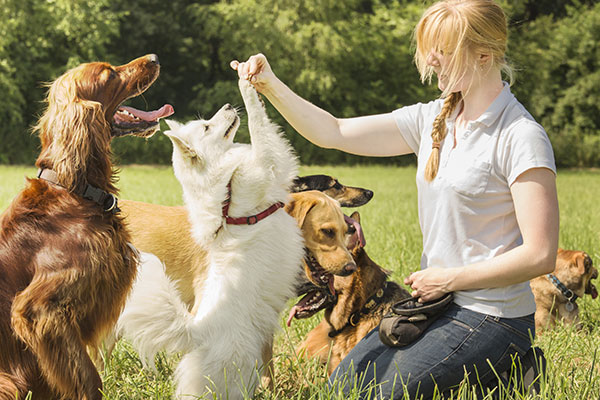Practical veterinary behaviour tips to solve pet stress
Wiki Article
Recognizing the Duty of a Veterinary Behaviourist in Pet Training and Health
The duty of a vet behaviourist is essential in addressing the detailed connection between animals and their owners. They incorporate veterinary medication with understandings from animal behavior scientific research to deal with issues like aggressiveness and anxiousness. Unlike conventional trainers, their strategy concentrates on the underlying causes of these actions. This nuanced point of view raises questions about the effectiveness of conventional training approaches and exactly how a deeper understanding can transform pet well-being. What approaches do they use to accomplish these outcomes?What Is a Veterinary Behaviourist?
A vet behaviourist is a specialized expert that concentrates on understanding and attending to the behavioral problems of pets, especially animals. Their know-how integrates vet medicine and pet behavior science, allowing them to detect and treat a vast array of behavioral issues - veterinary behaviour. These specialists typically hold postgraduate degrees, such as a Master's or PhD in pet actions, and are certified by appropriate organizations, ensuring they have a deep understanding of pet psychologyVet behaviourists analyze animals via thorough observation and analysis, considering factors such as genetics, environment, and training history. They develop tailored therapy strategies, which might include desensitization methods, positive reinforcement methods, and environmental changes. Collaboration with pet owners is important, as they supply guidance and assistance throughout the training procedure. Eventually, the goal of a vet behaviourist is to boost the wellness of the animal while fostering a harmonious connection between pets and their owners.
The Relevance of Recognizing Pet Actions
Comprehending animal habits is necessary for both animal owners and specialists in the field of animal care, as it lays the foundation for effective interaction and training. Identifying just how animals regard their environment and react to stimulations allows caregivers to develop an extra unified living situation. Understanding into behavior signs, such as body language and vocalizations, cultivates stronger bonds between pet dogs and their owners. By valuing the natural instincts and demands of different varieties, individuals can customize their training approaches to fit these variables, promoting far better learning and participation. Furthermore, a strong grasp of behavior scientific research help in recognizing stressors and possible triggers, enabling positive treatments. Generally, understanding animal behavior not only boosts the well-being of family pets however likewise enriches the experiences of those that look after them, ultimately bring about healthier, better partnerships.Common Behavioral Issues Addressed by Vet Behaviourists
Vet behaviourists regularly address typical behavioral concerns in pet dogs, consisting of aggressiveness and concern feedbacks. They also focus on stress and anxiety and anxiety management, which can significantly influence a pet's wellness. Recognizing these concerns is important for establishing efficient training and treatment approaches.Aggressiveness and Fear Responses
While many animal owners may see hostility and anxiety feedbacks as straightforward behavior concerns, these complicated responses commonly originate from underlying stress and anxiety or past trauma. Veterinary behaviourists play an important role in identifying the origin of these habits, which can materialize in various forms, including growling, attacking, or too much anxiety of certain scenarios. Recognizing these triggers is important for establishing effective training strategies tailored to each pet dog's one-of-a-kind conditions. Behaviourists use techniques such as desensitization and counter-conditioning to assist pet dogs manage their worries and aggression. In addition, they educate pet proprietors about proper administration strategies, highlighting the value of perseverance and consistency. Addressing aggression and worry feedbacks not just enhances the family pet's lifestyle but additionally strengthens the bond in between family pet and proprietor.Anxiety and Tension Administration
Anxiousness and tension are widespread concerns that lots of pets face, commonly arising from adjustments in their setting, lack of socializing, or previous negative experiences. Veterinary behaviourists play a crucial duty in determining the underlying sources of these problems. They utilize various methods, consisting of behavior modification, desensitization, and counter-conditioning, to help animals take care of anxiety. Additionally, they may suggest environmental adjustments, such as creating risk-free spaces or providing enrichment tasks that advertise relaxation. Cooperation with animal proprietors is vital, as behaviourists direct them in recognizing their family pet's signals and applying efficient coping approaches. By dealing with anxiousness and stress and anxiety, vet behaviourists add considerably to boosting the general well-being and top quality of life for pet dogs and their households.Exactly How Veterinary Behaviourists Vary From Conventional Trainers
Vet behaviourists vary from typical instructors largely in their instructional histories and training. While conventional fitness instructors usually concentrate on obedience and fundamental commands, veterinary behaviourists highlight understanding and addressing underlying behavior problems, integrating medical considerations into their approach. This distinctive emphasis enables them to provide an extra thorough therapy for animals with complicated behavior difficulties.Education and Training Distinctions
Comprehending the distinction in between veterinary behaviourists and typical trainers is important for family pet owners looking for reliable training remedies. Veterinary behaviourists have sophisticated levels in veterinary medication, typically followed by specialized training in animal practices. This education outfits them to deal with intricate behavioural problems that might come from clinical conditions or mental aspects. On the other hand, standard instructors usually have accreditations from training programs that concentrate on obedience and standard commands without diving into the underlying emotional or medical facets. While both professionals aim to enhance pet you could look here dog behaviour, veterinary behaviourists can detect and deal with behavioural problems holistically, integrating medical understanding right into training approaches. This crucial distinction highlights the relevance of choosing the best specialist based on the pet dog's particular requirements.Emphasis on Behavioral Issues
Attending to behavioural problems requires a nuanced technique that identifies vet behaviourists from traditional instructors. While traditional trainers typically concentrate on obedience and fundamental commands, vet behaviourists discover much deeper into the underlying reasons for troublesome behaviours. They employ a substantial understanding of animal psychology and therapy methods, which are rooted in scientific research. This know-how allows them to identify issues stemming from anxiety, anxiety, or aggressiveness, as opposed to merely addressing surface-level signs and symptoms. Additionally, veterinary behaviourists assess the pet's total wellness, thinking about environmental aspects and the pet's background. By incorporating clinical expertise with behavioural techniques, they offer customized solutions that promote lasting behavioural adjustment, making sure both the family pet's and owner's top quality of life are substantially enhanced.Clinical Factors To Consider Included
While standard trainers might overlook hidden clinical concerns, veterinary behaviourists focus on an extensive assessment of a family pet's health as a foundational action in attending to look at this website behavioural issues. This strategy allows them to determine possible medical conditions that might contribute to undesirable practices, such as anxiety, pain, or neurological conditions. By incorporating clinical examinations right into their practice, veterinary behaviourists can work together with vets to guarantee an alternative understanding of the pet dog's well-being. Additionally, they can suggest ideal therapies or adjustments to training plans based on medical searchings for. This considerable perspective distinguishes veterinary behaviourists from standard instructors, as they address both behavioural and health-related elements, ultimately causing extra reliable and lasting end results for family pets and their proprietors.
The Process of Collaborating With a Vet Behaviourist
Collaborating with a vet behaviourist includes a systematic technique to dealing with a pet dog's behavioral problems. The process starts with a comprehensive analysis, where the behaviourist gathers comprehensive information about the family pet's history, setting, and particular actions that are troublesome. This generally consists of sets of questions, interviews with the family pet proprietor, and sometimes observations of the family pet in its environment.Complying with the evaluation, the vet behaviourist creates a customized intervention plan that may include behavioral adjustment methods, training approaches, and, if necessary, recommendations for medical assessments. dog behaviourist near me. The plan is developed to be sensible and attainable, guaranteeing that it fits flawlessly right into the pet dog proprietor's way of living
Succeeding follow-up sessions are necessary to check development, readjust methods, and offer support. This joint effort not just intends to modify undesirable habits but likewise to improve the total wellness of the pet, making certain a harmonious relationship in between the pet and its proprietor.
Enhancing Your Animal's Top quality of Life With Behavioral Support
Enhancing a family pet's top quality of life through behavior support is essential for promoting a healthy and balanced and satisfying connection between pet dogs and their owners (board certified veterinary behaviourist). Vet behaviourists play an important duty in identifying and attending to behavior issues that may hinder a pet dog's well-being. With customized techniques, they aid alleviate stress and anxiety, anxiety, and aggression, eventually advertising a more balanced and pleased pet dogBehavior support includes different strategies, consisting of favorable reinforcement, environmental enrichment, and socialization. By carrying out these approaches, proprietors can create a nurturing environment that encourages positive behaviors. This not only improves the animal's emotional health and wellness however likewise reinforces the bond in between pet dog and proprietor.
In addition, routine appointments with a vet behaviourist warranty that any kind of arising behavioral worries are immediately attended to, protecting against rise. On the whole, investing in behavioral support is a positive technique that substantially enriches a pet's life, bring about boosted physical and psychological health and wellness end results.
Often Asked Concerns
What Qualifications Do Veterinary Behaviourists Have?
Vet behaviourists normally hold a veterinary degree, adhered to by specialized training in pet habits. Many additionally have certifications from identified companies, demonstrating their knowledge look at this web-site in dealing with pet habits issues and advertising general pet wellness.Can Vet Behaviourists Suggest Medication for Pet Dogs?


Vet behaviourists, having veterinary degrees and specialized training, can undoubtedly suggest medicine for family pets. This ability enables them to address underlying behavioral issues effectively, frequently combining medicinal therapy with behavior alteration methods for finest results.
The Length Of Time Does Behavioral Therapy Typically Take?
Behavior treatment duration differs substantially, generally varying from a couple of weeks to a number of months. Factors influencing this timeline consist of the animal's certain issues, uniformity of training, and the proprietor's engagement while doing so.Are Remote Consultations Offered With Veterinary Behaviourists?

Just how much Does a Veterinary Behaviourist Examination Expense?
The price of a vet behaviourist appointment commonly varies from $100 to $300, relying on variables such as location, experience, and session size. Added costs might look for follow-up examinations or specialized solutions.Report this wiki page